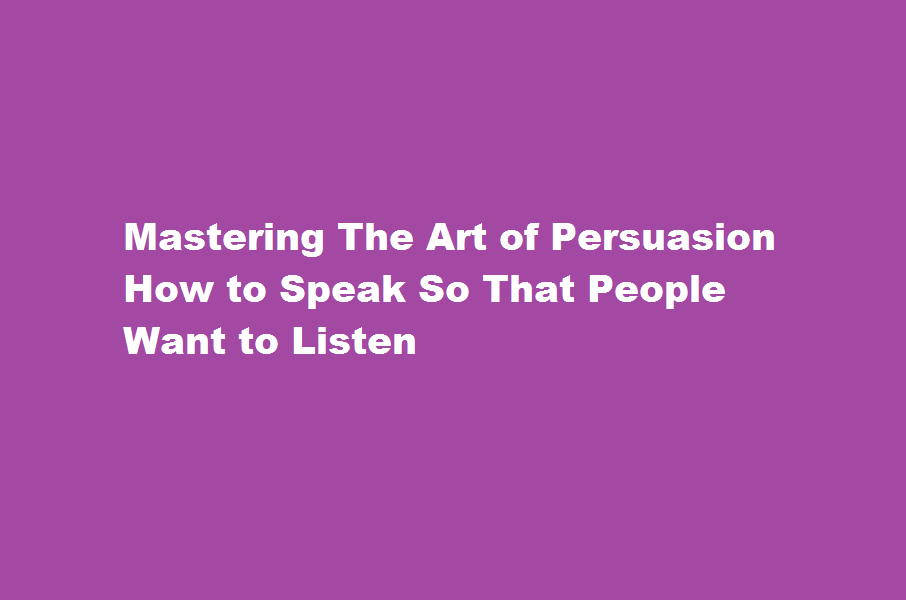Mastering The Art of Persuasion How to Speak So That People Want to Listen
3 min read
Introduction
Effective communication is a fundamental skill that can make or break relationships, careers, and even personal growth. Speaking in a way that captivates your audience and makes them genuinely want to listen is an invaluable asset in today’s fast-paced world. In this article, we will explore some key strategies and techniques that can help you become a persuasive and influential communicator.
Know Your Audience
One of the first steps towards becoming an engaging speaker is understanding your audience. Tailor your message to suit their needs, interests, and level of understanding. By taking the time to research and analyse their preferences and motivations, you can create a connection that resonates with them on a deeper level. Whether you’re speaking to a small group or a large audience, knowing your listeners allows you to address their concerns and make your message more relatable.
Craft a Compelling Opening
First impressions matter, especially when it comes to public speaking. Start your speech or conversation with a powerful and attention-grabbing opening. This can be an intriguing question, a thought-provoking statement, or even a personal anecdote. A compelling opening sets the tone for your entire presentation and sparks curiosity, making your listeners eager to hear more.
Be Authentic and Passionate
Authenticity and passion are contagious. When you speak from the heart, expressing genuine emotions and enthusiasm, people are more likely to be engaged and receptive. Share personal stories, use vivid language, and let your personality shine through. When you believe in what you’re saying, it becomes easier for others to believe in it too.
Use Clear and Concise Language
Clarity is key when aiming to capture your audience’s attention. Avoid jargon, complex terms, and convoluted sentences that can confuse or alienate listeners. Instead, use simple, concise language that conveys your message effectively. Break down complex ideas into easily digestible parts and use examples or metaphors to make your point relatable. Remember, clear communication leads to better understanding.
Utilise Engaging Body Language
Non-verbal communication plays a significant role in captivating an audience. Maintain good posture, use hand gestures to emphasise key points, and make eye contact to establish a connection. Your facial expressions should reflect the emotions you want to convey, further enhancing your message. A confident and engaging physical presence can hold the attention of your listeners and make your words more impactful.
Incorporate Storytelling
Storytelling has been an effective method of communication since ancient times. We are wired to connect with narratives, and stories have the power to inspire, educate, and entertain. Incorporate relevant and relatable stories into your speech or conversation to illustrate your points and create emotional connections. By weaving stories into your message, you make it memorable and engaging.
Practise Active Listening
Engaging speakers understand that communication is a two-way street. Actively listen to your audience’s reactions and adjust your message accordingly. Be receptive to feedback, both verbal and non-verbal, and address any questions or concerns. This shows that you value their input, creating a reciprocal dialogue and fostering a sense of engagement and collaboration.
FREQUENTLY ASKED QUESTIONS
Which is better to speak or to listen?
The person who’s doing the talking will feel understood and cared about. Most people go through life wishing to be listened to more. So by listening rather than talking, you are giving something valuable to the person who’s speaking.
Conclusion
Becoming a persuasive speaker who captures people’s attention requires practice, self-awareness, and a genuine desire to connect with your audience. By knowing your listeners, crafting compelling openings, being authentic, using clear language, incorporating engaging body language, leveraging storytelling, and practising active listening, you can elevate your communication skills to new heights. Remember, the ability to speak so that people want to listen is a valuable tool that can positively impact all areas of your life.
Read Also : Regain Access to Your SBI ATM Card A Step-by-Step Guide to Unblock it






